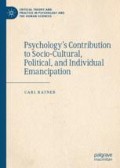Abstract
This chapter presents a thorough analysis of Martin-Baro’s Liberation Psychology. It draws upon untranslated, often unpublished, texts that were retrieved from his office in El Salvador. Liberation Psychology is an objective analysis of oppressive social conditions that oppress psychology. Martin-Baro also assessed the real social consciousness of factions of the population. This was his interpretation of conscientization. This indicates the revolutionary potential of the factions. Martin-Baro criticized peasants’ misunderstanding of their conditions. He also explained social reasons for their misunderstanding.
Access this chapter
Tax calculation will be finalised at checkout
Purchases are for personal use only
Notes
- 1.
A contemporary, American example of fatalism is the apathy of super-oppressed minorities to vote in elections where they comprise the majority of the population and could elect politicians from among their own ranks who would serve their needs. This is the case in Ferguson, Missouri, site of mass protests against police brutality in 2014. At the time, black people composed 67% of the population; yet at the time of riots over Michael Brown’s killing by police, 5/6 of city council members were white and 6/7 school board members were white, and the police force was predominantly white. Black people did not exercise their majority strength and declined to vote in elections for city council, school board, and police chief. Even worse, eight months after the rioters and citizens had urgently called for more representative city politics and black control, the city council election in April 2015 drew only 29% of all eligible voters to vote. This is fatalism which operated from inside black peoples’ consciousness to prevent them from easily controlling their social institutions. Even more fatalistic is the fact that “In the Ward 3 race, which includes the area Brown was from, and where many business were destroyed and looted in the unrest, only 19% of voters cast ballots…[This, despite the fact that] In Ferguson, a coalition of protesters, a liberal political group and a labor union – which included activists from the Organization for Black Struggle, the Working Families Party and the Service Employees International Union Missouri/Kansas state council – poured into the city in the final weeks to help get out the vote. Only one out of their three preferred [local] candidates won” (https://www.usatoday.com/story/news/2015/04/09/voter-turnout-ferguson-chicago/25527397/).
Thus, even when blacks had an overwhelming majority and were also encouraged to vote by progressive political organizations, they declined to vote for candidates who could have fulfilled their interests.
- 2.
Mao similarly made a precise class analysis of different interests among the peasantry during the Chinese Revolution. He defined rich peasant, poor peasant, landlord, and merchant. This allowed him to identify the different “levels” of class consciousness, social critique, and allegiance to the revolutionary struggle that currently existed. It also helped Mao to understand different kinds of education that needed to be addressed to the different groups in order to help them understand the sources of their problems, and to understand the kinds of solutions that were viable (Schram and Hodes 1997).
- 3.
Bettelheim (1979) identified a similar syndrome among Jews in Nazi Germany. He called it ghetto thinking, or the internal ghetto in consciousness. It denotes how interned Jews identified with their captors. Some Jewish leaders helped the Nazis deport and exterminate Jews.
- 4.
This is an important social-psychological phenomenon (which surfaces in the study of political psychology) that requires concerted political-psychological intervention. It demonstrates that (a) personal activities are not more compassionate and egalitarian and free from social organization than politics are and (b) a people’s psychology is not homogeneous, consistent, or continuous. Particular psychological issues are discrepant; they must be addressed individually to comprehend and alter their specific causes and characteristics. Progressive politics does not necessarily transfer to progressive personal activities.
References
Bettelheim, B. (1979). Freedom from ghetto thinking. In B. Bettelheim (Ed.), Surviving and other essays (pp. 243–271). New York: Knopf.
Fromm, E. (1984). The working class in Weimar Germany: A psychological and sociological study. Cambridge: Harvard University Press. (Originally published 1929).
Knight, N. (2007). Rethinking Mao: Explorations in Mao Zedung’s thought. Lanham: Lexington Books.
Kosik, K. (1976). Dialects of the concrete. Boston: Reidel.
Martin-Baro, I. (1987). Is the Salvadoran Macho? Boletin de Psicologia (University of Central America), VI, 24, 101–122. http://www.catedralibremartinbaro.org/html/imb.php
Martin-Baro, I. (1994). Writings for a liberation psychology. Cambridge: Harvard University Press.
Ratner, C. (2011). Macro cultural psychology, the psychology of oppression, and cultural-psychological enrichment. In P. Portes & S. Salas (Eds.), Vygotsky in 21st century society: Advances in cultural historical theory and praxis with non-dominant communities (Chap. 5). New York: Peter Lang.
Ratner, C. (2014a). The psychology of oppression. In T. Teo (Ed.), The encyclopedia of critical psychology. New York: Springer.
Ratner, C. (2014b). False consciousness. In T. Teo (Ed.), The encyclopedia of critical psychology. New York: Springer.
Ratner, C. (2014c). Emancipation. In T. Teo (Ed.), The encyclopedia of critical psychology. New York: Springer.
Ratner, C. (2016). The politics of cooperation and co-ops: Forms of cooperation and co-ops, and the politics that shape them. New York: Nova Publishers.
Ratner, C. (2017). The generalized pathology of our era: Comparing the biomedical explanation, the cultural-political explanation, and a liberal-humanistic-postmodernist perspective. International Critical Thought, 7(1), 72–92.
Ratner, C. (2019). Neoliberal psychology. New York: Springer.
Schram, N., & Hodes, N. (Eds.). (1997). Mao’s road to power: Revolutionary writings 1912–1949 (Vol. IV). Armonk: Sharpe.
Author information
Authors and Affiliations
Corresponding author
Rights and permissions
Copyright information
© 2019 The Author(s)
About this chapter
Cite this chapter
Ratner, C. (2019). Martin-Baro’s Liberation Psychology. In: Psychology’s Contribution to Socio-Cultural, Political, and Individual Emancipation. Critical Theory and Practice in Psychology and the Human Sciences. Palgrave Macmillan, Cham. https://doi.org/10.1007/978-3-030-28026-0_2
Download citation
DOI: https://doi.org/10.1007/978-3-030-28026-0_2
Published:
Publisher Name: Palgrave Macmillan, Cham
Print ISBN: 978-3-030-28025-3
Online ISBN: 978-3-030-28026-0
eBook Packages: Behavioral Science and PsychologyBehavioral Science and Psychology (R0)

